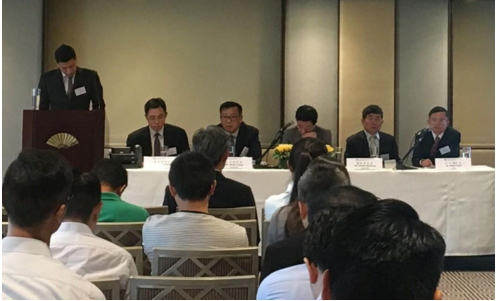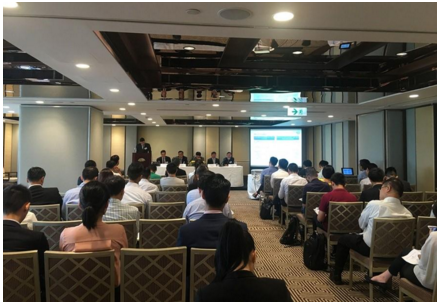
Kangda Intl. Environmental Co., Ltd. (hereinafter referred to as “Kangda EP”, stock code: HK06136) held the Interim Results Conference 2017 in Hong Kong on August 30, 2017. Leaders of Kangda EP attended the Conference, including Zhao Junxian, Chairman of the Board of Kangda EP, Zhang Weizhong, Chief Executive Officer and Executive Director of Kangda EP, Wang Litong, Executive Director and Vice President of Kangda EP, Wang Tianci, Executive Director and Vice President of Kangda EP, Li Zhaoliang, Financial Director of Kangda EP, and Ma Shiding, Vice President of Kangda EP.
In the first half of 2017, the total revenue of Kangda EP for its main business achieved RMB 1,068 million, a year-on-year increase of about 18%. The profit before tax reached about RMB 229 million, a year-on-year growth of about 37%.
In the first half of 2017, all businesses of Kangda EP have maintained the sustained and rapid economic growth. By June 30, 2017, the total amount of treated sewage has reached 3,863,400 tons, an increase of about 15% compared with 3,363,400 tons of treated sewage by the end of last year. By June 30, 2017, Kangda EP has signed contracts for 101 franchise projects, including 94 sewage treatment plants, 3 water supply plants, 3 sludge treatment plants and one reclaimed water treatment plant. By June 30, 2017, the total amount of daily treated sewage of new projects has reached 500,000 tons, including 350,000 tons from sewage treatment project and 150,000 tons from water supply project. The water plants of Kangda EP have been established in 14 provinces, municipalities and autonomous regions of China.
As for water environmental governance, Kangda EP has signed contracts for 3 comprehensive water environmental governance projects with an investment of RMB 3,389 million by the end of the first half of 2017, totaling the revenue of the period of RMB 108 million. The development in the field of water environmental governance benefits from the comprehensive water environmental governance development strategy made in 2016 and the strong market expansion based on the strategy.
As for the construction of “Beautiful Countryside”, Kangda EP has signed contracts for 2 rural sewage treatment projects with a total investment of about RMB 689 million, namely Yunan County Domestic Sewage Treatment PPP Project and Jiaoling County Domestic Sewage Treatment Facility PPP Project. In the first six months of 2017, the total revenue of projects in the field of Beautiful Countryside construction has achieved RMB 34 million.

Since the year 2017 is an important year for China to implement the “13thFive-Year Plan”, the environmental protection industry of China has shifted the emphasis from environmental pollution control to environmental quality improvement. PPP mode has embraced a rapid development, and the implementation rate of projects has witnessed a year-by-year increase. Besides, water environmental protection projects such as black-odor river management project and sponge city construction project have attracted an investment of RMB 1 trillion, leading to the explosive growth of environmental protection industry. Along with the holding of the Belt and Road Forum for International Cooperation in May 2017, the cooperation between China and countries along the Belt and Road will be increased in the field of environmental protection market.
In this situation, Kangda EP will actively give full play to its superiorities in such aspects as technology, market integration and financing, and put forward innovative ideas of business development through various cooperation methods like project cooperation and strategic alliance to achieve win-win development. In the future, Kangda EP will focus on its main businesses, make an overall arrangement with the integration of “planning, investment, construction and operation” and make an integrated plan on the ecological industrial chain of urban environmental protection project to achieve the implementation of projects, promote diversified development, advance with the times and engage in all ecological chains of environmental protection industry based on the combination of ecological construction and economic development.